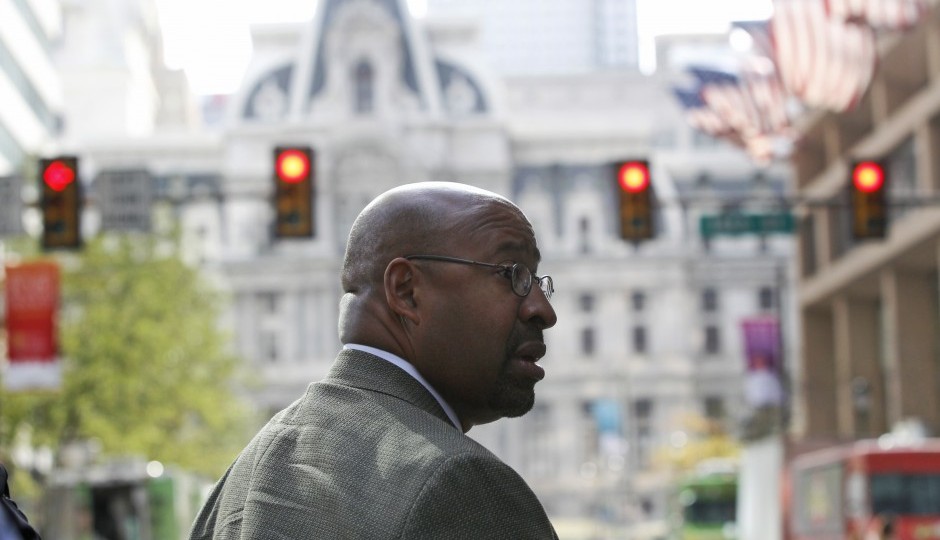Mayor Nutter Says It’s Time to Disband the School Reform Commission

(AP Photo/Mel Evans)
(Editor’s note: This is a developing story that will be updated.)
In a major education policy address, Mayor Nutter called today for the dissolution of the School Reform Commission, the state-created board that has overseen the School District of Philadelphia for the last 15 years.
“In my opinion and based on my experience – it is time to end the SRC.,” Nutter said. “It’s time for it to go.”
He called for a transition to a local school board comprised of nine members, five directly appointed by the mayor, four picked by the mayor from a list of 12 nominees prepared by City Council. And he proposed making the shift by September, 2017.
Why? Nutter cited two reasons. City control of its own schools will, he believes, increase community commitment to the district. Second, “Local control also eliminates confusion over who is responsible for what,” Nutter said. “Over the last 8 years, we’ve seen a revolving door of leadership everywhere but our local government – three governors, five Secretaries of Education, five School District Superintendents, six SRC Chairs and 17 SRC members.”
“Returning to local control means the voters of this city know who to hold accountable for educational outcomes – the Mayor.”
This is pretty interesting. While the SRC has many critics, Nutter has not typically been among them. After all, he gets to appoint two of the board’s five members, and he’s been largely in sync with the SRC on big decisions, from the selection of superintendents to school closures.
But in spite of that, it’s not really been possible for Philadelphians to hold Nutter accountable for city schools, not given a structure where the Governor appoints a majority of SRC members. And while holding the Governor accountable sounds good in theory, that presupposes having a Governor who much cares about Philadelphia schools (instead of, for instance, Tom Corbett who cancelled his only planned visit in four years to a district-run Philadelphia school when he got word of scheduled protests).
It’s fair to wonder why Nutter didn’t say something similar four or five years ago, back when retiring the SRC would have left him accountable for a new school board, and not his successor. Nutter didn’t address that in his speech, but I think he’d say his focus in this years-long school crisis has been on securing state (and local) money for the district, not on the governance question.
At any rate, Nutter now says the SRC should go. Officially, so too does Gov. Tom Wolf, who called for the SRC’s abolition while running for governor last year. Ditto City Council. And of course, the Philadelphia Federation of Teachers has long said the SRC has overstayed its welcome.
So. Does this mean the SRC is finished? Does Nutter’s pronouncement mark the beginning of the end for the embattled commission?
I doubt it.
Nutter’s got just a few months left in office, after all, and likely successor Jim Kenney hasn’t said a word about abolishing the SRC. Asked for comment on Nutter’s remarks, the Kenney campaign replied: “Jim’s immediate focus is on the funding crisis. We cannot allow a debate over the District’s governance to put the state funding we desperately need at risk.”
Wolf has also been quiet on the question of the SRC’s future. If he’s been laying the groundwork to dissolve the SRC — which would take either a vote of the SRC itself or an act of the General Assembly — I’ve not heard a whisper about it. When asked what the Governor made of Nutter’s remarks, Wolf spokesman Jeff Sheridan wrote “Governor Wolf has expressed his support for local control of the School District of Philadelphia, but he has not endorsed a specific plan.” Sheridan then went on to tout Wolf’s proposed education investments, which have of course become entangled in the four-month budget impasse.
SRC Chair Marjorie Neff, who was appointed to the commission by Nutter and elevated to chair by Wolf, also stressed the state funding question in a brief phone interview.
Neff said that SRC members don’t themselves object to a return to local control, but they do first want to see state funding for the district both increased and made more reliable. “There’s no reason why we can’t begin thinking about and planning for a return to local control as we continue to work on the issue of funding,” Neff said. Later, she added, “I don’t want that process in any way to be a distraction from getting the state to fully fund our education system. Certainly our local government has done its part and then some while the state has continued to do less and less.”
Follow Patrick Kerkstra on Twitter @pkerkstra.